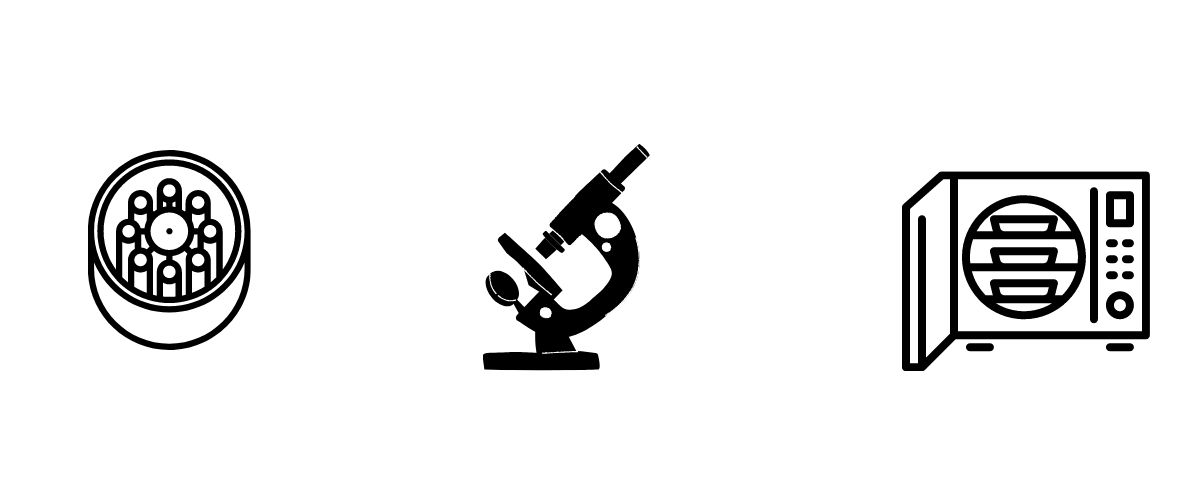
A tissue culture laboratory would not be able to complete research, conduct tests, or grow tissues without an assortment of specific, specialized laboratory equipment. While all labs will have slightly different equipment needs based on their specific purpose and research designs, here is a list of equipment that will help you get started on preparing your tissue culture laboratory.
Autoclave
Method of operation: Autoclaves produce pressurized steam to eradicate bacteria, fungi, and other pathogens.
Purpose: Autoclaves let you sterilize lab equipment, glassware, and other tools.
Biological Safety Cabinets
Method of operation: Biological Safety Cabinets (BSCs) work by providing an aseptic environment and containment for cell culture. Most tissue culture laboratories use Class II BSCs as standard, but labs using potentially hazardous reagents or primate cell lines may use Class III BSCs.
Purpose: BSCs serve to protect laboratory workers and the surrounding environment from pathogens.
Centrifuge
Method of operation: Centrifuges separate heterogeneous mixtures into their various components – liquids in liquids, solids in liquids, and liquids in gases, based on the different densities of the components. A centrifuge uses a motor to spin liquid samples at high speed, moving the denser components to the outside of the test tube and allowing the solids to settle completely and rapidly at the bottom of the tube.
Purpose: A centrifuge is needed for the removal of preservatives, experimental additives, and other substances.
CO2 Incubator
Method of operation: CO2 incubators have a CO2-monitoring device that controls the amount of CO2 in the enclosed incubation space, a water pan for humidification, and natural convection with perforated shelves to allow air circulation.
Purpose: A CO2 incubator ensures a controlled environment for the optimum growth of cell lines.
Glassware
Method of operation: Glassware contains your solutions and cultures and lets you move them from one place to another. Different forms of glassware have different properties; for example, you will certainly need heat-resistant Erlenmeyer flasks to prepare tissue culture media.
You will also need culture jars and smaller capacity flasks for culture growth and manipulation.
Purpose: Glassware will be used to store your cultures and you will use different pieces during various experiments and processes.
Hot Air Oven
Method of operation: Hot air ovens used forced air circulation to maintain a high uniform temperature throughout the interior space.
Purpose: A hot air oven will allow you to quickly dry your washed glassware. Hot air ovens that operate at very high temperatures can also be used for sterilization.
Laminar Flow Hoods
Method of operation: Laminar flow hoods are used in a wide array of applications to keep airborne particles away from work space and lab operators. They can be configured horizontally or vertically to accommodate different sizes of working equipment.
The air from a laminar flow hood goes back into the environment untreated so only non-hazardous materials should be handled in this type of work zone.
Purpose: Laminar flow cabinets provide airflow that helps keep the working environment free of contaminants. They prevent airborne contamination by providing uniform HEPA-filtered airflow across the work area.
Liquid Nitrogen Freezer
Method of operation: Liquid nitrogen freezers provide cryopreservation storage at -150°C to -190°C temperatures. Liquid nitrogen freezers offer vapor or liquid phase storage and are the most reliable solutions for long-term cryostorage.
Purpose: A liquid nitrogen freezer is used to store and preserve cell line stocks.
Magnetic Stir Bars and Stir Bar Retrievers
Method of operation: Magnetic stirrers use a rotating magnetic field to move a stir bar around in liquid samples. A stir bar retriever is a strong magnet that allows you to remove the metal stir bar from your glassware without having to reach into it.
Purpose: Magnetic stirrers prevent contamination from other types of stirring.
Optical Microscope
Method of operation: Microscopes allow you to see microorganisms and cells that cannot be seen with the naked eye. Optical microscopes use light refraction or reflection to magnify an object positioned correctly under the lenses.
More advanced microscopes, such as electron microscopes, may or may not be necessary depending on the kind of research done in your lab.
Purpose: Optical microscopes allow you to observe cells, thin sections of tissue, microorganisms and other particles that cannot be seen without magnification.
pH Meter
Method of operation: pH meters use electrodes to measure hydrogen ion activity in water-based solutions.
Purpose: pH meters measure the acidity or alkalinity of a solution.
Precision Balance
Method of Operation: An enclosed measuring pan prevents interference from dust, air currents, and other particles. Electromagnets are used to counteract the force of the mass is measured.
A precise measurement is then displayed based on the exertion of this counteractive force.
Purpose: A precision balance allows you to take incredibly precise measurements of mass.
Refrigerator and Freezer
Method of operation: Refrigerators are used for the local storage of media and reagents. Freezers are used to store unstable media, serum, and reagents.
Purpose: Refrigerators and freezers provide cold storage.
Sink
Method of operation: A sink provides access to hot and cold tap water. It allows water and other fluids to drain into plumbing lines. Depending on the types of solvents and solutions your lab uses, you may want a lead-lined sink for corrosive elements.
Purpose: Sinks allow your lab technicians to clean their hands and to wash glassware as needed.
Water Bath
Method of operation: A water bath heats water to the desired temperature with electric heating elements.
Purpose: Water baths heat samples under a constant and controlled temperature with little fluctuation. These are also used when heating to very precise temperatures is required.
Water Purification System
Method of operation: There are various types of water purification systems that reduce the amount of impurities and bacteria in the water. Some options are Millipore water purification systems that produce Type 1 Ultrapure Water, double-distillation systems, and reverse-osmosis systems.
Purpose: A water purification system will purify water for media preparation
Casework and Storage Options
While the equipment listed above is necessary for a tissue culture lab to function, you also need to have the space to organize and store this equipment, as well as the surfaces necessary for conducting research and experimentation. Creating the right environment for tissue culture requires sanitary, strong, and ergonomic casework and storage space.
For lab casework and storage, you can’t go wrong with custom stainless steel lab furnishings. Stainless steel is easy to keep free of contaminants and is resistant to the growth of bacteria as well as oxidation and corrosion.
At OnePointe Solutions, we create fully welded metal cabinets that come in a multitude of options so that you can choose the casework that best meets your needs. All of our metal cabinets and casework come with a powder coat finish and a five-year warranty, as well as soft-close hinges, door slides, and the option to customize.
Custom Tissue Culture Lab Benches, Tables, and Countertops
Every lab space has unique dimensions and surface needs. The best way to get the most out of your space is to have custom benches and tables. That way, you don’t have to worry about equipment not fitting or about haphazard bench functionality. Instead, you can rest assured that your benches will be able to do exactly what you need, 100% of the time.
Personalized accessories and countertop materials ensure that your lab will function just as needed. For tissue culture labs, stainless steel is a good choice since it is easy to clean and resists contamination.
Epoxy resin is another quality choice for countertops, as it helps prevent corrosion and moisture buildup. It is also durable, heat resistant, long-lasting, and resists mold growth and other forms of contamination.
Phenolic resin countertops are a third option. These can help you meet laboratory requirements while staying cost-effective and providing resistance to chemicals, water, and wear and tear.
Custom microscope tables are also advantageous to have in a tissue culture lab. They ensure that you have all of the optional features and options that you need to improve productivity in your tissue culture lab.
In addition, they are versatile and improve your storage space, making them a perfect addition to your tissue culture lab.
Custom Design and Planning
OnePointe Solutions offers help with custom floor plans for your tissue culture lab and would be happy to get a sales representative and designer to discuss your needs and vision with no cost or obligation to you. From custom casework and benches to specialized floor plans, you’ll find a solution to any workstation needs or concerns with us at OnePointe Solutions.
Custom lab furniture can be made in your preferred color, dimensions, countertop and frame materials, and so much more. With custom lab furniture, you don’t have to worry about compromising to try to fit prebuilt options into your space; your space determines the dimensions of your custom pieces.
You’ll never have to be concerned about ergonomics or whether or not your equipment fits in your lab! Similarly, an individualized floor plan design helps you make the best use of your space and guarantees that you are part of the process every step of the way. Reach out to us today for more information!
Need Help Designing a Tissue Culture Lab?
Call us at (866) 222-7494 to speak to a lab specialist today. They will help you walk through the process of planning and designing a tissue culture lab that’s ideal for your facility. Whether you’re renovating an existing space or building an entirely new custom building, OnePointe Solutions has the lab-design experts you need to make your project perfect.


